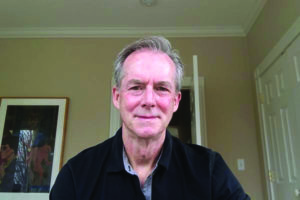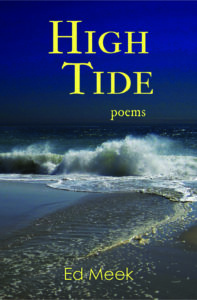
Ed Meek’s fourth book of poetry is all about cycles. High Tide, which Aubade Publishing will put out in July (its May launch was postponed due to the coronavirus), takes us through the ins and outs of a life of quiet observation, memory, and speculation. The titular “high tide” can refer to a swell of exuberance, as in Meek’s many lovely nature poems. But “high tide” can also be a metaphor for danger, crisis, or threat, and other poems in the collection speak to contemporary issues such as climate change, war, and political division.
“The book explores those two sides of that metaphor,” says Meek, who chose quotations from Henry David Thoreau and Bob Dylan to open his collection.
“Thoreau sees nature as means to awaken our spirit,” Meek says. “Thoreau also wrote ‘Civil Disobedience,’ which I identify with, and, like Dylan, I believe that music, song, and poetry can be politically charged.”
Originally from Milton, Meek now splits his time between Somerville and Wellfleet. A number of poems from High Tide are about life on the Outer Cape, including the lovely “Hammock,” which sways from a pleasant afternoon in the Wellfleet shade to regrets of trips not taken, to a meditation on Christopher Columbus’s first encounter with the Mayan people.
Meek says that poems like “Hammock” require a little research, a pleasant part of the poet’s work. “I looked up where hammocks come from,” he explains. “I didn’t know they were originally made from the barks of trees and that Columbus had written about them. I think a lot of people don’t realize there’s often a research component to poetry. I often start with words that stick with me, or interesting language, or the language of a particular subject. Then I’ll work backwards.”

Poetry has been part of Meek’s life for a long time. “I was encouraged by teachers in high school,” he says, recalling his experience working on the school’s literary magazine. As a student in UMass Amherst’s honors program, Meek was able study writing further, and then he pursued an M.F.A. at the University of Montana.
Among his favorite teachers was the poet Richard Hugo. “Hugo would say that when the poem starts off, there’s the idea of the ‘triggering town,’ ” Meek recalls. “There’s an image that starts off the poem, but you have to be willing to follow the poem where it goes and not just take it where you think it should go.”
Meek’s poem “Junkyard of Broken Dreams” is dedicated to Hugo. It’s one of the darker works in the collection, in which the tide turns to loss and devastation. The “triggering” image of busted cars and an old boat takes a sudden leap when, out of nowhere, a soldier rises up “to make his last stand,/ fight the losing battle to the bitter end.”
“Lottery” is another poem from High Tide that reflects on war, violence, and masculinity. In it, the narrator imagines pulling a draft number that sends him straight to Vietnam, where he fights alongside his father and brother and dreams of saving the captain of the football team from enemy fire. Poems like this are among the strongest in the collection, well placed counterpoints to the more peaceful meditations on nature and family.
Several of Meek’s poems have been featured locally. “Summer in Wellfleet” was recorded for WCAI’s Poetry Sunday in 2018. It’s a poem that celebrates private moments of wonder, sometimes difficult to squeeze in among the throngs of seasonal tourists, but always cherished: “In summer, when cars flood the roads,/ I take the trails through the woods,” Meek writes. “If I’m lucky,/ I’ll run across a doe/ or a bushy-tailed fox./ Ladder-backed woodpeckers/ type their enigmatic code/ into the bark of trees… I like to walk/ to kettle ponds and swim/ until I forget/ whatever it was/ I had to do.”
Another poem, “On the Outer Cape,” was published in WBUR’s Cognoscenti Newsletter in 2019, and “Hunting Mushrooms with Mina,” a poignant memory of a friendship that celebrates both difference and sameness, received an honorable mention in the 2017 Joe Gouveia Outermost Poetry Contest, judged by Marge Piercy.
These days, Meek, a retired teacher, says he’s finding comfort in watching films and listening to music at home as a way of coping with the coronavirus pandemic. “In poetry, there is also the focus on language and song,” he says. “Poetry is close to music.” The music of High Tide provides a fine backdrop for the meditative spirit, offering joyful odes to nature as well as thought-provoking ballads.



